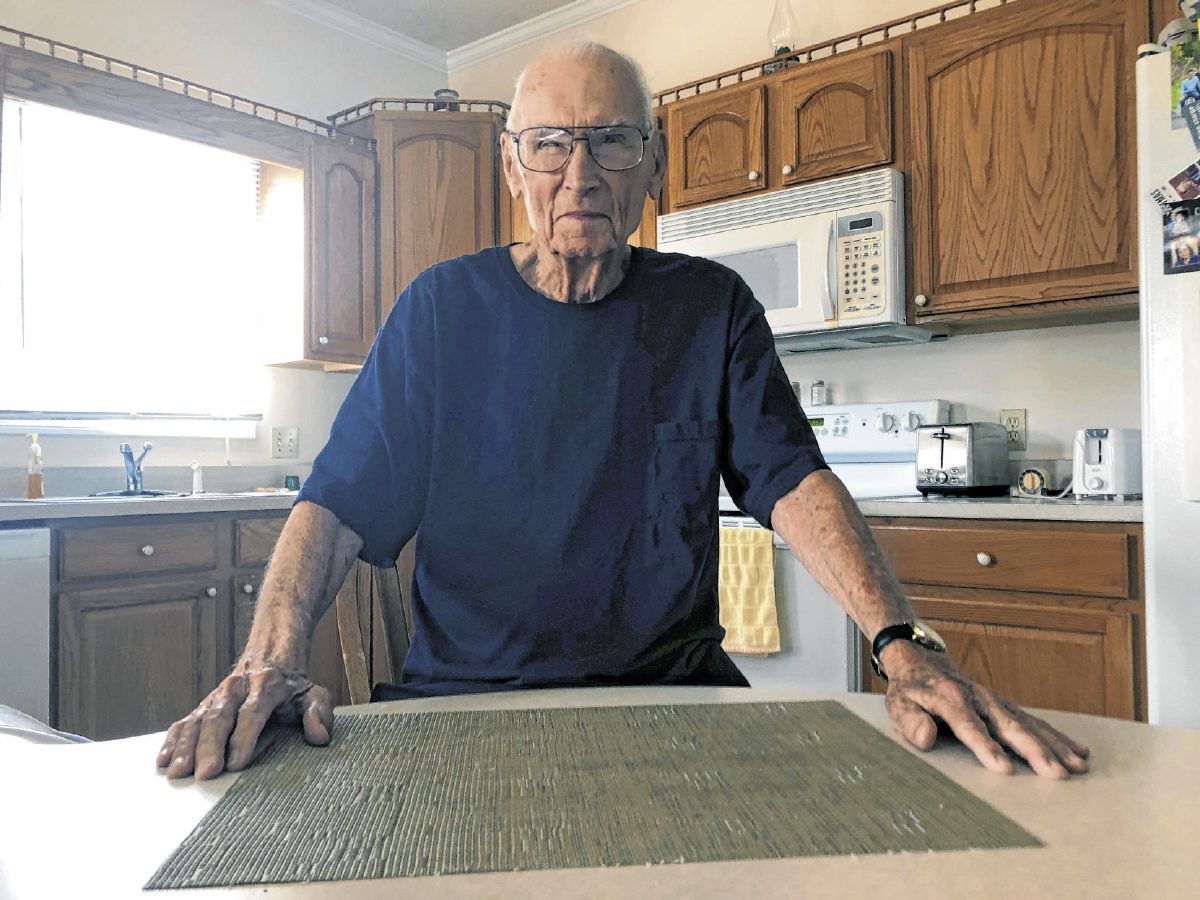
Basketball has always been a favorite sport of Richard Hamilton’s.
The 94-year-old Seymour man can remember games and scores from when he played the sport in grade school and games from his three years on the varsity team at Shields High School.
“I remember playing Emerson Elementary one year,” he said. “Ed Elsner was on their team and we beat them 4-0 in the final game of the season and I had two of the points. Years later, Ed and I still talked about it.”
It’s those stories Hamilton likes to discuss with friends. So many remember those times, but what many may not know is that his love of basketball also overlapped his time of service during World War II.
[sc:text-divider text-divider-title=”Story continues below gallery” ]
Hamilton enlisted in November of 1943 and was on active duty on Feb. 1, 1944, with the U.S. Army Air Forces. After basic and other training, he was sent to England where he landed in May of 1945. He was in several different areas throughout Europe, but eventually ended up being stationed in Belgium where he lived in a chateau with four squadrons.
Much to the native Hoosier’s delight, there was a gymnasium in the top of the chateau.
“I decided I’d be able to play basketball and was excited about it,” he said.
Hamilton went on to play all throughout Europe with the squadron he had been assigned.
He remembers beating a really good team that was well known in France.
“It was fun to win that one,” he said.
Hamilton also remember defeating teams in Germany and interacting with a lot of the players.
Nowadays, he still enjoys watching college basketball at home. He cheers for all teams in Indiana, unless he’s forced to choose when they play one another.
“I’m a follower of Purdue because I have great grandchildren there and a son-in-law who has his masters from there,” he said. “I love basketball.”
To play basketball in Europe, Hamilton had to serve.
He remembers the time when he landed in England in May of 1945. There was significant news on the day he arrived in Europe: The German military had surrendered.
“That was a good deal,” he said. “It wasn’t a big, formal surrender, but it was the beginning of the end.”
It also meant he missed out on any combat action.
“I was fortunate to not have to get into combat stuff,” he said.
Even though Germany was close to surrendering, times were still tense as Hamilton remembers being told German submarines had chased his convoy on the way over.
“We never got fired at that I know of,” he said.
Once he landed in England, he spent 10 days there before going to Paris, France.
“I got to go there a few nights,” he said.
There he had the chance to work with A-26 planes, which he said is similar to a B-26, but a little smaller.
“I don’t remember how many months I was with that, but they finally shipped me up to Reims, France, and I was in Camp Chicago with about a million other guys waiting to get shipped to Japan,” he said.
While waiting to go to Japan, Hamilton learned President Harry S. Truman had authorized dropping two atomic bombs on Japan, so the planned trip to Asian-Pacific Theater of World War II was over.
When work came, Hamilton said he spent time flying in a B-17 to take photographs all over Europe. He was told those would be used so the military would know the lay of the land in case there was another global conflict.
Some of those trips were in excess of 10 hours a day.
Times were difficult during his time of service, Hamilton said, because he was not able to contact his family very often.
He remembers his mother making him have a military portrait taken and having to send to her and having to write home to give the family updates.
“It’s not like today where you can talk to everyone,” he said. “I’d go for stretches of over a year without seeing them, which was hard at times. I was a small town boy that had not gotten out and did much.”
There were still plenty of lessons to take from serving. Being in the military taught him about looking after himself and others and also provided a solid structure. It also inspired him to think positively.
“It taught me that if you want to do something, you better grab a hold of it and do it,” he said. “If you don’t do that, then you won’t end up doing it.”
Hamilton was discharged on May 20, 1946.
“I loafed around Seymour for a little while and went to Wabash College in 1947, got married later in 1947 and then graduated in 1950,” he said.
After receiving his degree in history, he worked for Arvin Industries, Cummins and then managed National Homes.
Hamilton and his family left Seymour in 1955 and went to work in Terre Haute.
“National Homes was shutting things down because not as many people were building homes,” he said.
He returned to Seymour in 1985 after his first wife passed away and then retired.
“LIfe has been pretty good to me,” he said.
While Hamilton doesn’t attend too many Veterans Day programs, he said he is glad that those who served are remembered.
He also enjoys remembering all the basketball games he played in Europe.
“That was a long time ago,” he said.
